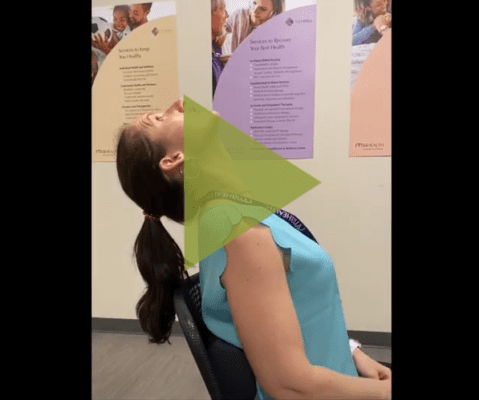

Technology is a regular part of modern daily life and has, for many, become a literal pain in the neck. The hours spent hunched over technology—cell phones, tablets, and computers—can result in a condition coined Text Neck Syndrome, a stress injury to the neck, shoulders, and cervical spine. Text neck, also known as tech neck or forward head posture, is a modern condition characterized by neck pain and stiffness resulting from excessive or prolonged use of electronic devices, such as smartphones, tablets, and computers. When using these devices, especially for extended periods, people often crane their neck forward and downward, which can strain the muscles, ligaments, and tendons in the neck and upper back.
Physical therapists are inundated with complaints of the syndrome. RVNAhealth Director of Outpatient Rehabilitation Services, Kate Campbell, DPT, provided insight into the phenomenon increasingly seen in patients at the Rehabilitation & Wellness Center.
What are the symptoms of Text Neck Syndrome?
- Nagging or sharp pain in the upper back or neck that is often triggered when bending the neck in a downward forward motion
- Excessive discomfort and stiffness in the shoulders, neck, and upper back, particularly at the end of the day
- Headaches, often frequent, exacerbated by screen time
- Decreased or painful head mobility
How are symptoms assessed?
A physical examination and medical history are part of evaluating patients with the symptoms of Text Neck Syndrome. Review of discomfort, mobility limitations, and lifestyle are all relevant factors in comprehensive assessment and if more serious injury or diagnoses are suspected, a referral for imaging could be recommended. A treatment plan developed by a physical therapist is often the appropriate course of action for many patients.
How is Text Neck Syndrome treated?
All RVNAhealth patients receive personal assessments and treatment programs to address individual presentation of symptoms. There are strengthening exercises and posture adjustments that can mitigate the discomfort and physical misalignments that accompany the syndrome.
A customized plan is developed to address the needs of each patient based on individual lifestyle and ability which can include time working with a physical therapist at the Rehabilitation & Wellness Center and at-home exercises.
Physical therapy can be accessed through a doctor referral or, for Connecticut residents, through the statewide Direct Access program which enables CT residents to see a physical therapist without doctor referral for up to six visits.
Are there ways to prevent neck strain?
Yes! 

Regular stretching can also help to release muscle strain and strengthen stabilizing muscle groups. We recommend chin tucks and gentle arching/backbends while seated to help. You can view some of these recommended stretches in video included here.
Finally, take frequent breaks from technology whenever possible. Take deep breaths while going on a short walk and remember to stand straight with the shoulders back. Practicing good posture is a worthwhile habit!
Since society’s reliance on technology is not likely to dissipate, mindfulness of body position during use can minimize the negative physical consequences of excessive screen time. If you feel you may suffer from Text Neck Syndrome, or any similar ailment causing discomfort, contact the RVNAhealth Rehabilitation & Wellness Center team at 203.438.7862. For more information about our RVNAhealth Rehabilitation & Wellness Center visit www.rvnahealth.org/rehab.
RVNAhealth is a private, 501c(3) non-profit organization which provides a continuum of care to people in 35+ towns across Fairfield, Litchfield, and New Haven Counties. RVNAhealth depends on financial support from individuals like you who believe that healthy communities improve the quality of life for everyone. Every gift — no matter the size — is critical to upholding our mission and sustaining our important work. If you would like to support RVNAhealth’s mission to deliver unmatched, compassionate healthcare when and where it is needed, please click here.



